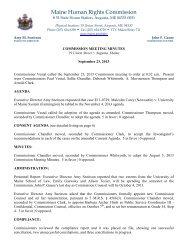SOS: A Handbook for Survivors of Suicide - American Association of ...
SOS: A Handbook for Survivors of Suicide - American Association of ...
SOS: A Handbook for Survivors of Suicide - American Association of ...
Create successful ePaper yourself
Turn your PDF publications into a flip-book with our unique Google optimized e-Paper software.
❦<br />
Stages <strong>of</strong> Grief<br />
While you may hear or read about a detailed list <strong>of</strong> “grief stages,” it’s truly<br />
different <strong>for</strong> each person. Some <strong>of</strong> the common emotions experienced by<br />
anyone who mourns are listed below. You may encounter some or all <strong>of</strong><br />
them, and in no particular order...<br />
SHOCK. The daze one feels immediately after a tragedy is actually the mind’s<br />
first line <strong>of</strong> defense. It insulates you from having to process the entire<br />
magnitude <strong>of</strong> it, allowing you to function until you can get your bearings.<br />
(See page 7).<br />
DENIAL. Death is the most difficult <strong>of</strong> all realities to accept. It is common to<br />
feel a sense <strong>of</strong> impossibility, or that it’s all just a bad dream. In time, our<br />
minds become more able to analyze the tragic event in a rational, realistic<br />
way, allowing denial to give way to less troubling emotions.<br />
GUILT. Guilt comes from a mistaken belief that we could have, or should<br />
have, prevented the death from happening, or from regret over irreconciled<br />
aspects <strong>of</strong> the relationship. In truth, we all do the best we can given our<br />
human shortcomings. We cannot predict the future, nor do we have power<br />
over the events in our universe. It is human nature to subconsciously blame<br />
oneself rather than accept these truths. (See page 16).<br />
SADNESS. Once the “reactive” emotions have either passed or become<br />
manageable, the basic sadness that accompanies any loss moves to the<br />
<strong>for</strong>efront. This may be felt more acutely when confronted with reminders or<br />
special occasions. As we gradually learn to accept our loss and embrace<br />
happy memories <strong>of</strong> our lost loved one, we make room in our hearts <strong>for</strong><br />
happiness to re-enter.<br />
ANGER. It is common to feel anger toward the person you have lost. Many<br />
who mourn feel a sense <strong>of</strong> abandonment. Others feel anger toward a real<br />
or perceived culprit. (See page 21).<br />
ACCEPTANCE. This is the mourner’s goal, to accept this tragic event as<br />
something that could not have been prevented, and cannot be changed.<br />
Only with acceptance, can you move on with your life. (See page 24).<br />
8

















